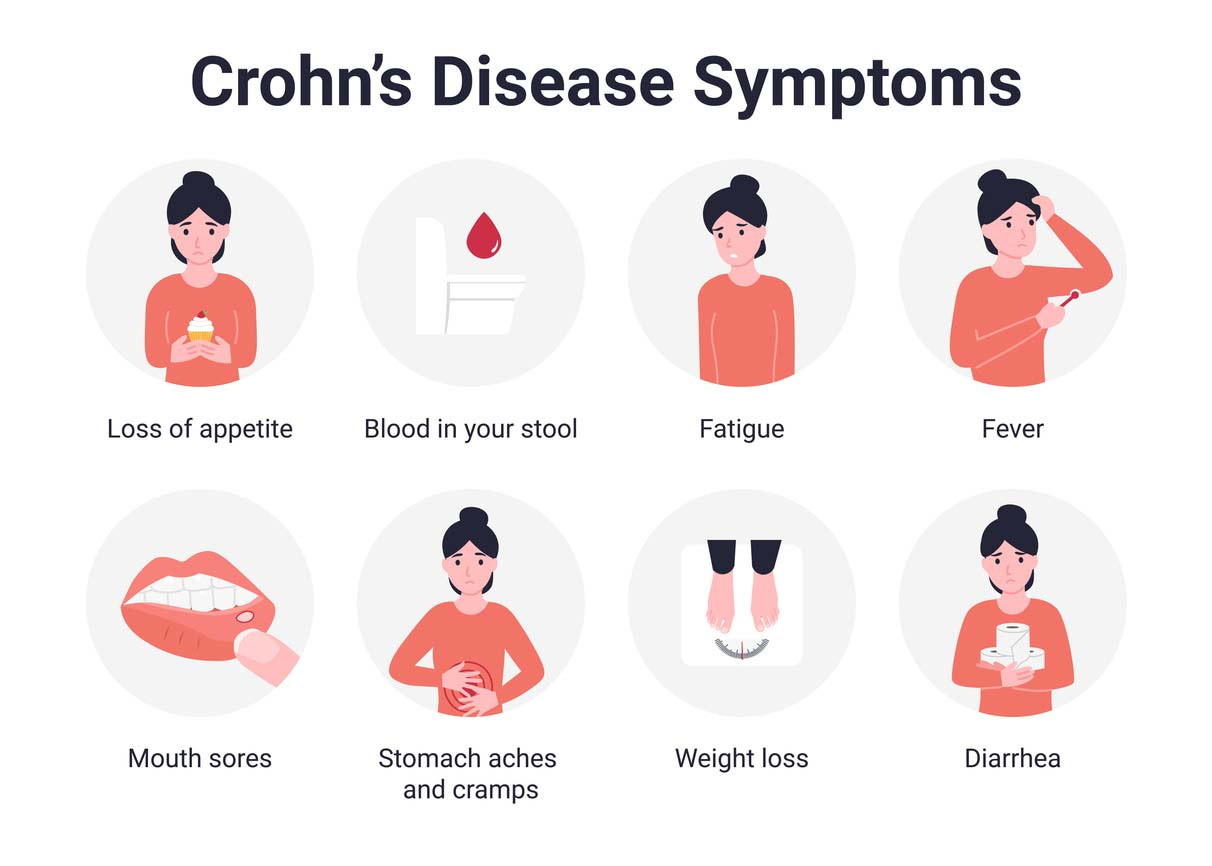Crohn's disease is a chronic inflammatory bowel disease (IBD) that can affect any part of the gastrointestinal tract, from the mouth to the anus. It is a lifelong condition that causes inflammation in the digestive system, leading to various symptoms that can range from mild to severe. While the exact cause of Crohn's disease is unknown, it is believed to involve an abnormal immune response, genetics, and environmental factors. Below are the common symptoms associated with Crohn's disease.
1. Abdominal Pain and Cramping
One of the hallmark symptoms of Crohn's disease is persistent abdominal pain, often described as cramping. The pain is usually located in the lower right side of the abdomen but can occur anywhere in the belly. This discomfort is due to inflammation and ulceration of the intestinal walls, which can also cause a feeling of bloating or fullness.2. Diarrhea
Chronic diarrhea is another prominent symptom of Crohn's disease. This may be watery, urgent, and frequent, sometimes accompanied by blood, pus, or mucus. The inflammation in the intestines disrupts the body’s ability to absorb water and nutrients, leading to loose stools.3. Fatigue
People with Crohn's disease often experience extreme tiredness and fatigue, even when they have not engaged in strenuous activities. This could be the result of the body's ongoing immune response, poor nutrient absorption, or anemia (a common complication due to blood loss from the intestines).4. Weight Loss
Unintended weight loss is common in Crohn's disease, due to malnutrition. Inflammation can affect nutrient absorption, and the fear of triggering symptoms may cause people to eat less. As a result, the body doesn’t get the necessary calories and nutrients.5. Loss of Appetite
Many individuals with Crohn's disease experience a significant reduction in appetite. The discomfort and pain associated with eating can make food unappealing, exacerbating weight loss and nutritional deficiencies.6. Blood in Stools
Inflammation in the intestines can lead to ulcers and bleeding, which may result in blood appearing in the stools. This could range from bright red blood to dark, tarry stools, depending on where the bleeding is occurring.7. Fever
Some individuals with Crohn's disease may experience fever, particularly during active flare-ups. This fever is often low-grade but can rise if there are complications, such as an abscess or infection.8. Mouth Sores
Crohn's disease can cause ulcers in the mouth, similar to canker sores. These sores are often painful and can interfere with eating and drinking.9. Joint Pain
Joint pain and swelling, known as enteropathic arthritis, are common extra-intestinal symptoms of Crohn's disease. This can affect the large joints, such as the knees, ankles, and elbows, and may come and go with disease activity.10. Skin Problems
People with Crohn's disease may develop skin conditions, such as red, tender nodules (erythema nodosum) or ulcerative sores (pyoderma gangrenosum). These often occur on the legs or arms and may be associated with disease flare-ups.11. Eye Inflammation
Eye issues, such as uveitis (inflammation of the middle layer of the eye) and episcleritis (inflammation of the white part of the eye), can occur in some people with Crohn's disease. These conditions can cause redness, pain, and blurred vision and usually require prompt treatment to prevent complications.12. Constipation
Although diarrhea is more common, Crohn's disease can also cause constipation, especially if the inflammation leads to narrowing or obstruction of the intestines. This condition, known as a stricture, can make it difficult for stool to pass through the digestive tract.13. Perianal Disease
Crohn's disease can cause inflammation around the anus, leading to perianal disease. Symptoms include pain, swelling, and drainage from around the anus, as well as the development of fistulas (abnormal tunnels between the intestine and skin), abscesses, or fissures (small tears).Severity and Flare-Ups
The symptoms of Crohn's disease can fluctuate over time. During periods of remission, symptoms may lessen or disappear entirely, but they can return during flare-ups, which can be triggered by stress, infection, or certain foods.Conclusion
Crohn's disease presents a wide variety of symptoms, primarily affecting the digestive system but also causing issues beyond the gut, such as joint pain, skin problems, and eye inflammation. The severity of the symptoms can vary from person to person, and managing Crohn's disease often involves lifestyle changes, medication, and sometimes surgery. If you or someone you know is experiencing persistent gastrointestinal issues or any of the above symptoms, it's important to seek medical advice for proper diagnosis and treatment.Read more :
1= https://bulkdrchecker.com/blogs/what-are-the-symptoms-of-crohns-disease/
2= https://bulkdrchecker.com/blogs/what-are-the-symptoms-of-high-blood-pressure/
3= https://bulkdrchecker.com/blogs/what-are-the-symptoms-of-hpv-in-females/
4= https://bulkdrchecker.com/blogs/what-are-the-symptoms-of-lupus/
5= https://bulkdrchecker.com/blogs/what-are-the-symptoms-of-lyme-disease/

